Is Pulse the Same as Heart Rate? 2 Key Differences
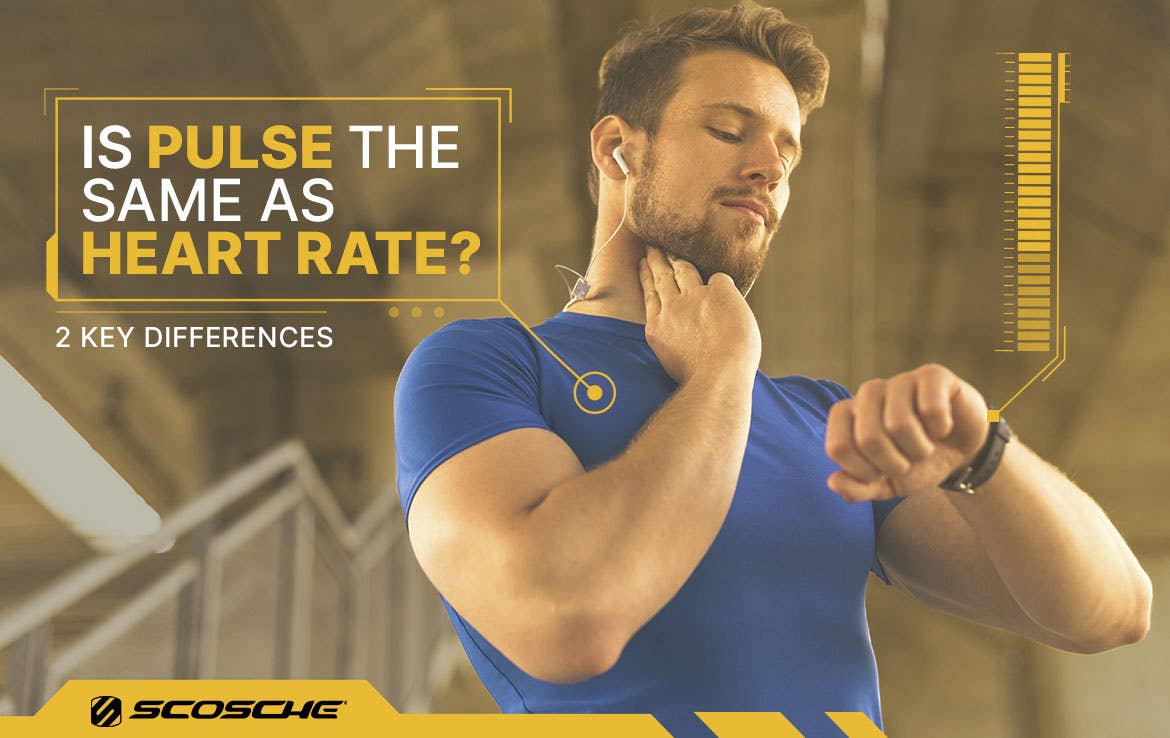
While often used interchangeably, pulse and heart rate aren’t technically the same thing. For most people, the differences aren’t particularly important. If you want to have a good baseline for health and understand what heart rates are optimal for exercise, knowing your pulse is pretty much good enough. However, if you really want to get serious about your health and your training, understanding the small differences can help take you to the next level.
Difference 1: Definitions
For many healthy individuals, heart rate and pulse are the same. However, that isn’t true for everyone. Let’s break it down:
Heart Rate: Your heart rate is the rate of contractions (heartbeats)
Pulse: Your pulse measures the rate of blood pressure increases
Difference 2: If You Aren’t Healthy, the Two May Be Out of Sync
So, yes, for most people, there’s no meaningful difference between the two. You could split hairs about the rate of heartbeats versus the rate of blood pressure, but it really wouldn’t affect your day-to-day life. However, if you aren’t in the best of shape, these two measures start to creep further apart.
If you aren’t healthy, your pulse may actually be lower than your heart rate. If your heart is beating and pushing blood through your body but is not able to do it fast enough, you’ll end up with a pulse that’s faster than your heartbeat. We’ll go over some reasons this may be the case a bit later.
Heart vs. Pulse
That’s really about it when it comes to the differences. You’ll find that whenever you look up things to do with heart rate, the terms “heart rate” and “pulse” are used interchangeably quite often. In fact, it’s much easier to find them used interchangeably than it is to find them differentiated. What this means is that, unless you’re a doctor (or just really into science), you won’t have much call for differentiating the two. However, whichever term you use, it’s still a major measure of your overall health and something you want to check periodically — especially if undertaking new exercise regimens.
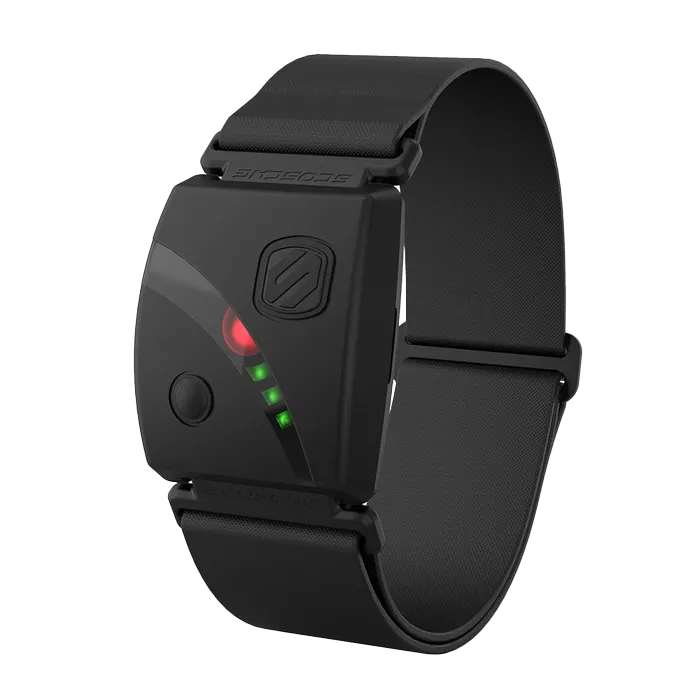

How to Track Heart Rate
For simplicity’s sake, we’ll be exclusively using the term heart rate from here on out. So, if you go to learn more and see the term “pulse” used, know that the information is the same.
It’s a good idea to track your heart rate from time to time. You don’t have to be frenetic about it, but it’s worth it to understand your resting and active heart rates and see how they change as your fitness increases.
There are a few ways to check your heart rate manually, but the wrist and neck methods tend to be the most common and easiest.
Wrist: Place your first two fingers on the inside of your wrist. You want them resting between the bone and the tendon over your radial artery. Basically, you want your fingers on your wrist, closer to your thumb and just below the palm of your hand. You should feel your heart rate quite easily here.
Neck: The other option is placing your index and middle fingers under your jaw and beside your windpipe. This one can be slightly trickier for some people, so you may have to move slightly or increase the pressure a bit to feel your heart beating. Having your fingertips lightly touching the bottom of your jaw when doing this may help you find the right spot more easily.
Once you’ve chosen your method and found your heart rate, it’s time to check your heartbeat. Simply set a one minute timer and count the beats you feel during that minute. From there, you’ve got your heart rate, aka BPM or beats per minute. You could also time it for 30 seconds and multiply by two if you prefer.
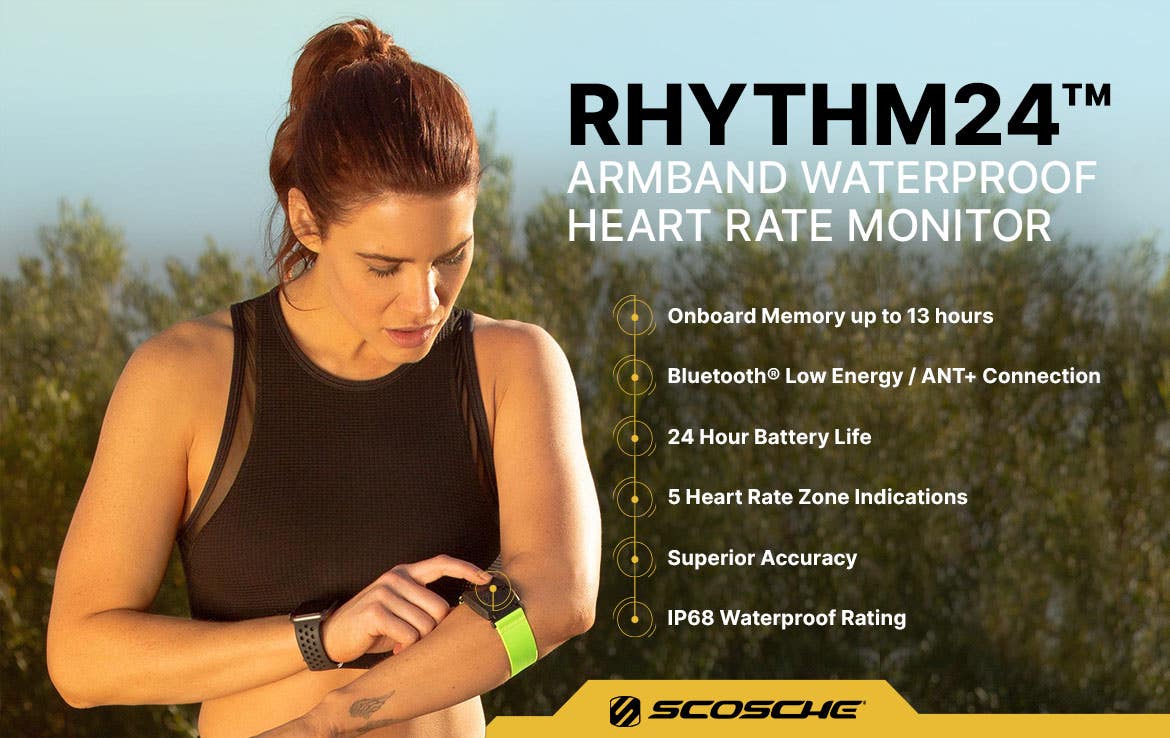

There’s plenty of wearable tech now that can give you a really accurate BPM instead of going manually if you want to track your heart rate during a workout. A wearable heart rate monitor can give you all kinds of useful data. Any kind of heart rate monitor can be beneficial here, whether you want a wristband, watch, chest strap or something else entirely.
Tracking your workouts, while not directly linked to your heart rate, is just a good way to measure your fitness. If you keep a log of your heart rates in relation to the workouts you’re doing, you can see how you progress over time. Even if you’re in the pool or doing triathlon-based workouts, a waterproof heart rate monitor can go with you wherever you go.
Your elevated heart rate isn’t the only useful measure of fitness, though. Resting heart rate is also important. If you want to measure your resting heart rate, the best time to do so is first thing after you wake up. If that’s not an option, make sure you wait at least an hour after a strenuous workout to measure it — though waiting two hours is even better.
What’s a Good Heart Rate?
This is a tough question because there’s no one right answer here. A good heart rate depends mainly on your age and gender, though other outside factors will affect it as well. You could strap on a health armband and monitor your heart rate at all times, but having a general understanding of a healthy heart rate is likely enough for most everyone. Health armbands and other wearable fitness gear will make your heart rate tracking easier in general, though.
There are two main heart rates you want to familiarize yourself with: your maximum heart rate and target heart rate. Your maximum heart rate is just what it sounds like – how fast your heart can pump blood when you’re redlining it and pushing yourself to the limit. Your target heart rate is between 50-85 percent of that maximum heart rate, and it’s the range you want to find yourself in during a solid workout.
As a general rule, your maximum heart rate is about 220 minus your age. Therefore, if you’re 40 years old, your maximum heart rate is about 180. This, of course, depends on your level of fitness, but it’s a good baseline number to start from.
Note that if you’re above or below average size, your optimal heart rate may not line up with the charts. While a good general measurement, they can only dictate what’s optimal for the average person.
If you’re a former college football player who has maintained a high level of fitness for the last 20 years, your heart rate may be much lower than what’s considered the optimal goal since you need to tax your heart more to really get it going. Conversely, if you haven’t been in ideal shape for a while, you may have to work up to that target heart rate slowly and over time.
How and When Does Heart Rate Change?
Your heart rate will change throughout the day. When you exercise, your heart rate increases, and when you’re at rest, it decreases. It’s perfectly normal for your heart rate to change throughout the day. In fact, if it didn’t, you’d be in serious trouble.
Outside of everyday activities changing your heart rate, positive and negative lifestyle choices will also affect it. While those are more long-term changes to your heart rate, they’re also the most crucial. The more positive lifestyle choices you make, the healthier your heart rate and the higher your overall quality of life.
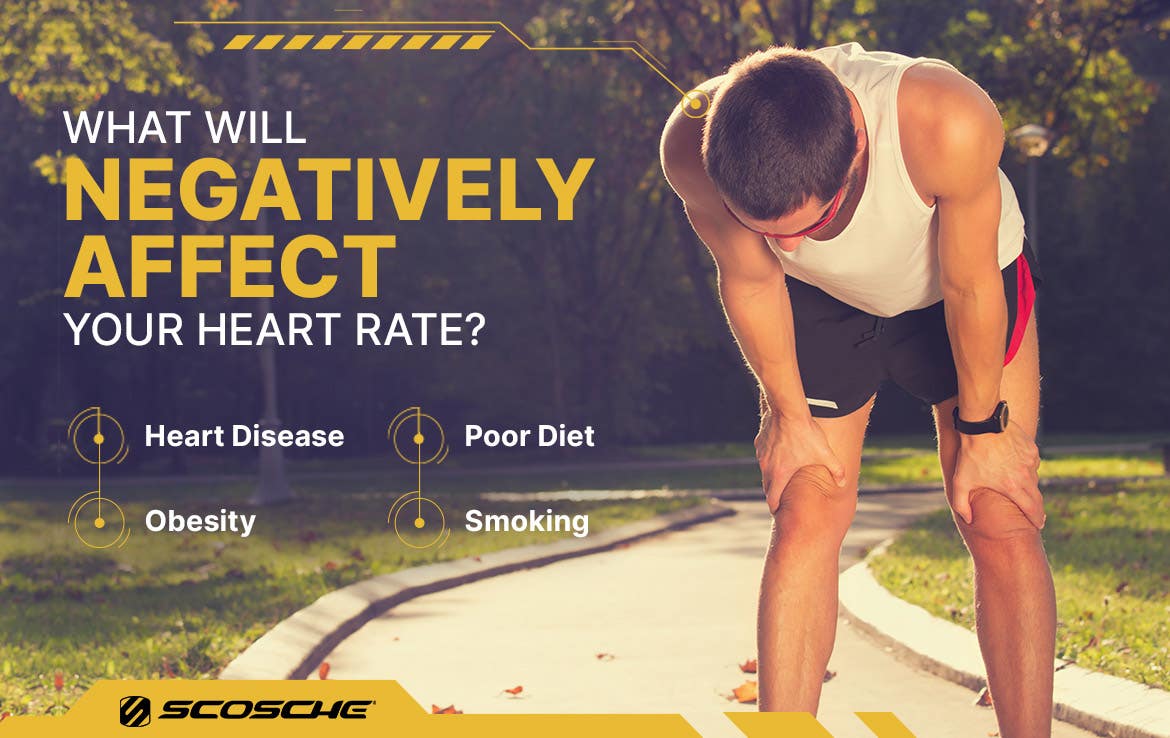

What Will Negatively Affect Your Heart Rate?
As you might guess, all those things you know are bad for you but maybe do anyway aren’t doing your heart rate any favors. Small things every now and then won’t really do your heart rate and health any harm, but many Americans have conditions that negatively affect heart rate. In fact, they’re some of the most common ailments in not just the U.S. but the world as a whole.
Heart Disease
Seems like an obvious one, but it’s also the leading cause of death in every middle to upper-income country in the world. In fact, it’s even the top cause of death in lower/middle income countries as well as in the top five for low-income countries, according to 2019 World Health Organization data.
“Blood flow to the heart muscle (myocardium) is obstructed by a partial or complete blockage of a coronary artery by a buildup of plaques.” Things like high blood pressure, high cholesterol and smoking put you at higher risk for heart disease. While certain factors like familial history may be out of your control, nearly half of the U.S. has one of those three previously mentioned risk factors for heart disease.
Obesity
While often mentioned in the conversation with heart disease, obesity can cause its own separate problems. If you’re overweight, your heart has to work harder, which results in a higher heart rate than you may like, even doing everyday tasks. This is a more complex area, and depending on how much weight you’d like to lose, you may want to consult a physician before jumping right into major life changes.
Poor Diet
Your heart is like a car. If you take care of your car, do all your scheduled maintenance and give it high-quality oil and fluids, it’ll last you a long time. If, however, you neglect your car, it’ll eventually leave you stranded and in need of a new one. You don’t have to reinvent the wheel immediately. In fact, it’s very possible that it’s more important to find a diet that you can stick to sustainably than to undergo a “crash diet” and try to change everything at once.
Smoking
Surprise — smoking is bad for you. No one is recommending nicotine as a part of a balanced diet, though roughly 12 percent of Americans smoke (which is a percentage that has been decreasing over time). This number is less than the global average but still contributes to hurting your heart health and heart rate. While smoking isn’t something that’s easy to quit for many people, a plan to quit smoking — if you currently do — is essential to lowering your heart rate.
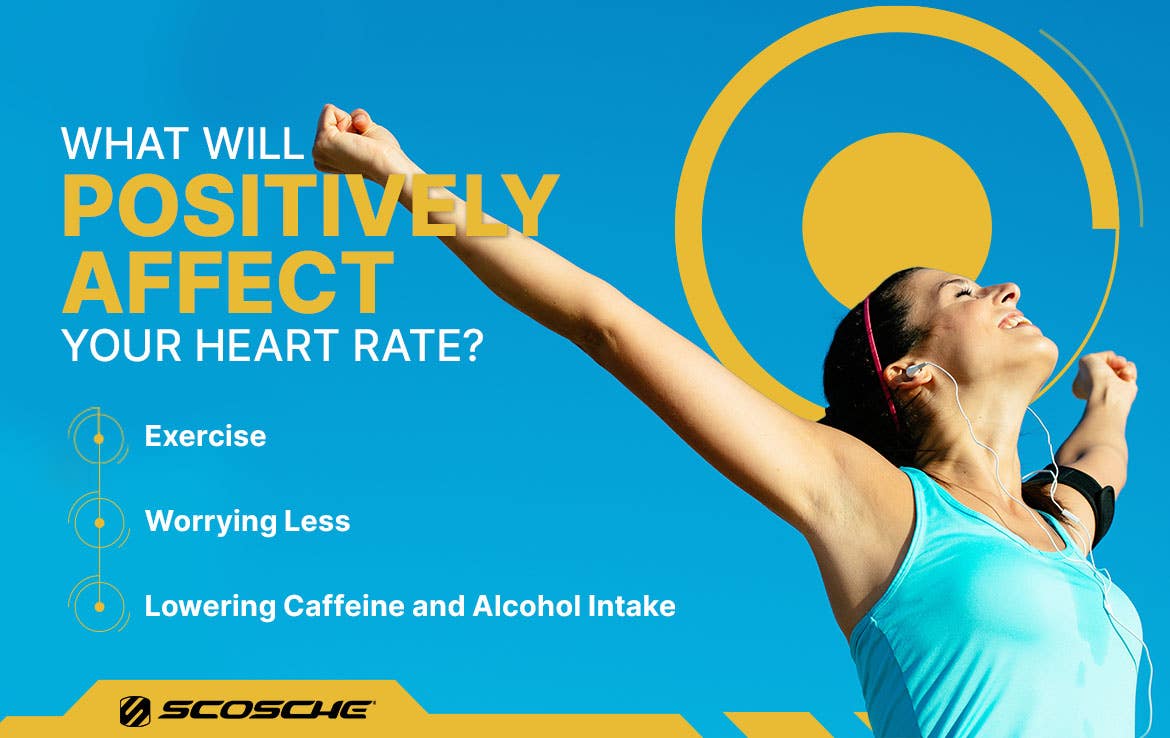

What Will Positively Affect Your Heart Rate?
There are plenty of practical ways you can lower your heart rate and improve your fitness. You don’t need to make mountainous lifestyle changes in a day, but incorporating some of these into your daily routines over time will improve your quality of life.
Exercise
The more you cause your heart to work hard, the better it gets at it. This is something you want to slowly ramp up to, especially if it’s been a while since you were in a gym. Take small, attainable steps and go slowly. It’s better to feel like you have a little left in the tank than push yourself to failure when first starting out.
Lowering Caffeine and Alcohol Intake
Almost all Americans consume some form of caffeine. More than half of Americans drink alcohol regularly. Neither caffeine nor alcohol is necessarily bad for everyone all the time. If used in moderation, neither is likely to seriously compromise your health. However, if nothing else, excessive alcohol or caffeine consumption can lead to poor sleep, which is going to hurt you on your quest to lower your heart rate.
Not Worrying So Much
This one is twofold, with both direct and indirect points.
One: Stress is bad for your overall health. Sure, a little stress can be necessary to get you going, but a little can go a long way. If you’re constantly stressed, it’s going to take a toll on your overall health and simultaneously increase your heart rate if stress causes you to stop working out or eating a healthy diet.
Two: Your heart rate isn’t going to magically lower overnight. This takes time. While technology that can measure your heart rate is helpful, becoming obsessive over it won’t help you in the long-term. Take your time, be intentional with your diet and exercise and your heart rate will slowly improve along with your overall health.
Image Credits
chesterf/Shutterstock.com
Dirima/Shutterstock.com
ZinetroN/Shutterstock.com
Crdjan/Shutterstock.com
AstroStar/Shutterstock.com